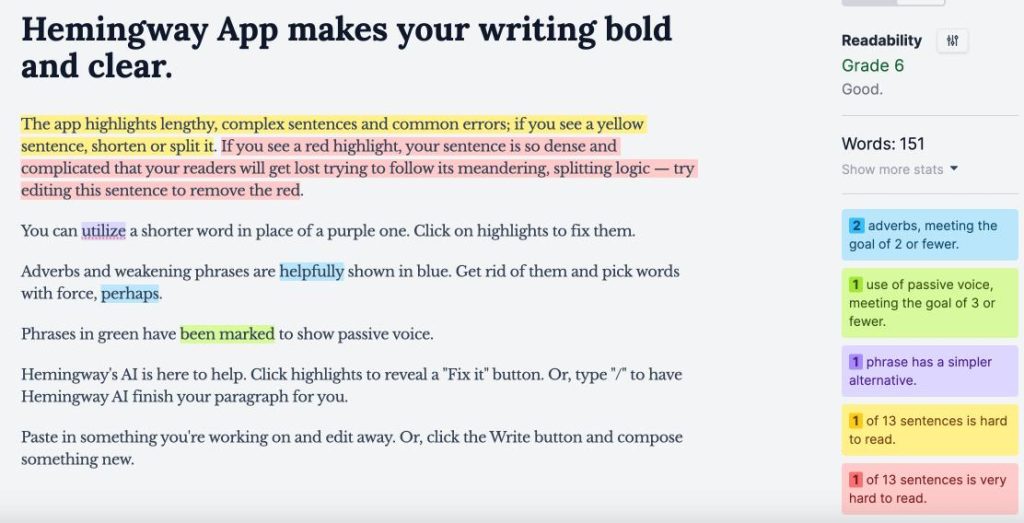Authors seeking to get help with book writing can explore five impactful avenues:
- engaging with writing communities or buddies
- utilising writing software
- enrolling in masterclasses and courses
- working with ghostwriters
- collaborating with professional editors
Each avenue is rich with benefits, offering aspiring writers diverse forms of support. This blog post delves into five specific advantages of each type of resource, accompanied by practical ideas on where and how to find them. Read on to discover a comprehensive guide to resources that empower writers at every stage of their creative process.
Writing communities or buddies
Writing with a partner or joining writing communities can be a valuable resource for getting help with book writing. Here are some groups and communities you can join and platforms that facilitate finding a writing buddy:
Online writing communities
- Accountabuddy Exchange helps you to find a writing partner who will hold you accountable and support you during your writing journey.
- Critique Circle is free to join and claims to be one of the oldest online groups for writers, founded in 2003.
- Facebook groups offer both general writing communities and those focused on specific genres or aspects of writing. For instance, the Writers Unite! Facebook group has over 73,000 members, and its mission is to support and encourage writers at all levels of knowledge and experience.
- Discord writing-related servers are a place where you can discuss your writing, ask for advice and share experiences.
- Goodreads writing groups on Goodreads related to your genre or specific writing interests. There are often dedicated critique groups and forums for writers.
- NaNoWriMo (National Novel Writing Month) is an annual writing month in November, during which writers worldwide challenge themselves to complete a novel.
- Reddit: Platforms like r/writing or r/WriteWithMe on Reddit are great places to connect with other writers. You can share your work, ask for feedback and participate in discussions.
- Scribophile claims to be one of the largest and most award-winning online writing communities, with free and paid membership options.
Local writing groups
- Local libraries and community centres: Check for local writing groups or workshops in your area. Look for groups and events at bookstores, libraries or community centres.
- Local Meetups: This popular platform connects people with similar interests, including writers and authors looking for supportive communities. Meetup has 2,700 writing groups with nearly 2 million members.
- Local chapters of writers’ organisations: Every country has writers’ organisations that support their members in many ways, from sponsorship through guidance and advice to workshops and knowledge-sharing. Contact them to get information on the existing writing networks in your area. Here are some associations for writers that operate internationally, in the US, UK and Canada:

What kind of help can you get from writing communities, groups and buddies?
- Feedback exchange: Writing communities and groups offer a platform for receiving constructive feedback and critiques on your work, helping you identify strengths and areas for improvement.
- Motivation and accountability: Joining writing groups or working with a writing buddy fosters motivation and accountability, encouraging you to stay on track with your writing goals.
- Shared knowledge and resources: Writing communities often share valuable insights, tips and resources related to the craft.
- Networking opportunities: Engaging with writing communities provides networking opportunities, potentially connecting you with peers, industry professionals and beta readers.
- Emotional Support: Writing buddies and groups offer emotional support during the writing process’s highs and lows, creating a sense of community and understanding among fellow writers.
Writing software
Another way to get help with book writing is to use one of several popular writing software programs. Here are some widely used ones:
- Evernote is a note-taking app that allows users to organise notes, ideas and research. Useful for writers who prefer to capture and organise ideas on the go for $15 per month.
- Grammarly is an AI-powered writing assistant that checks for grammar, spelling, and style errors. It is available as a browser extension, desktop app, and Microsoft Word add-on. There is a free and premium plan ($12 per month).
- Hemingway Editor is an app designed to improve the readability of your writing by highlighting complex sentences and suggesting improvements. The online version is free; the premium version with AI features is $10 monthly.
- IA Writer is a minimalist writing app that focuses on a distraction-free writing environment. It is available on various platforms, including macOS ($50), Windows ($30), and Android ($30).
- QuillBot is an AI-powered writing tool that helps users improve their writing by simply entering the text and exploring the suggestions. The basic plan is free, and the premium version costs $20 monthly.
- Reedsy Book Editor is a free online writing tool that allows you to write, format, and export your manuscript. It integrates with the Reedsy marketplace for professional editing and publishing services.
- Scrivener is specialised software for writers, offering tools for organisation, outlining, and research designed for long-form writing projects for $60 per month.
- Ulysses is a writing app for macOS and iOS focusing on distraction-free writing. It provides a clean interface and organisation tools for $6 per month.

What kind of help with book writing can you get from writing software?
Software can be a valuable tool in assisting you with the process of writing a book. Here are some ways you can leverage writing software for help:
- Organisation and outlining tools help create a structured and cohesive plan for your book.
- Word processing capabilities allow seamless writing, editing and formatting of your manuscript.
- Checks for spelling, grammar, readability and word count help enhance your writing quality and consistency.
- Goal and deadline tracking within the software keeps the writer motivated and on track.
- Exporting and publishing features enable the generation of files compatible with various formats when the text is ready for publishing.
Writing masterclass and courses
Writing courses and masterclasses can provide valuable guidance and support for aspiring authors. Here are some platforms where you can find help in writing a book through masterclasses and courses:
- Coursera hosts a variety of writing courses from universities and institutions worldwide. These courses cover topics such as creative writing, novel writing and storytelling. Some courses are free, while others may have a fee.
- CreativeLive offers live and on-demand classes across various creative disciplines, including writing. You can find courses on writing fiction, non-fiction and the business side of being an author.
- Gotham Writers Workshop provides online writing classes in various genres, including fiction and memoir writing. They offer both short courses and longer, more comprehensive workshops.
- MasterClass offers online classes taught by renowned experts, including successful authors. Writers like Neil Gaiman, James Patterson or Margaret Atwood provide insights into their writing processes, techniques and the craft of storytelling.
- Reedsy Learning offers free online courses on writing and publishing. Topics include novel writing, character development and book marketing.
- Skillshare features a variety of writing classes on specific genres, storytelling techniques and writing productivity. It operates on a subscription model, providing access to all courses for a monthly fee.
- The Writers Studio offers online writing workshops and classes focusing on fiction and poetry. The courses are designed to help writers at all levels hone their craft and develop their unique voices.
- Udemy is an online learning platform that offers numerous writing courses at various levels. Courses include novel writing, character development, plot structure and more. Prices vary, and discounts are often available.
What type of help can you get from writing masterclasses and courses?
Enrolling in writing masterclasses and courses can provide various benefits and help in various aspects of the book writing process. Here are some ways these classes can assist you in writing a book:
- Craft and technique: Learn and refine your writing skills by gaining insights into the craft and techniques used by successful authors, such as character development, plot structure and other fundamental aspects of writing.
- Genre-specific guidance: Access courses tailored to specific genres, helping you navigate the unique conventions and expectations of your chosen writing style.
- Time management and productivity: Learn strategies for managing your time effectively, overcoming writer’s block, maintaining consistent writing habits and goal-setting.
- Industry insights: Gain knowledge about book marketing, author branding, and navigating the publishing landscape, including traditional and self-publishing routes.
- Real-world advice: Understand the challenges and triumphs of the writing and publishing journey, gaining practical advice from the course instructors.

Work with a ghostwriter
Another way to get help with book writing is by hiring a ghostwriter. Ghostwriting involves writing content for someone else, typically under their name, with the understanding that the named author will take full credit for the work. Ghostwriters are hired to capture the voice and style of the credited author, often contributing to projects like books, articles or speeches. To find a professional ghostwriter, try one of the following sources:
- Alliance of Independent Authors maintains a directory of vetted partners, such as designers, editors and ghostwriters, who can help authors publish a book.
- Association of Ghostwriters is the professional organisation for ghostwriters of books, articles, speeches, blogs and social media content.
- Editorial Freelancers Association has a directory of professional freelance ghostwriters and offers clear pricing guidelines.
- Reedsy Marketplace gathers the industry’s top professional book editors, cover designers, book marketers and ghostwriters.
What kind of help can you get by working with a ghostwriter?
Working with a ghostwriter can provide substantial assistance in writing a book. Here are some ways a ghostwriter can help with book writing:
- Writing expertise: Ghostwriters bring a high level of writing expertise to every project.
- Voice and style matching: A good ghostwriter can adapt their writing style to match yours and capture your voice and tone, ensuring that the book feels like it was written by you.
- Research skills: Ghostwriters often have strong research skills, enabling them to gather information and incorporate it seamlessly into your book, especially for non-fiction projects.
- Editing and revision: Ghostwriters provide thorough editing and revision services, refining the manuscript to enhance clarity, coherence, and overall quality.
- Genre expertise: Many ghostwriters specialise in specific genres, allowing them to bring genre-specific knowledge and expertise to your project.

Work with an editor
Finally, working with a professional editor is an effective way to get help with book writing. The best way to find an editing professional is to check the member directories of the organisation of editors. Being a member of such an organisation indicates a commitment to professional standards, experience and transparent pricing. Here is a list of the certified editing associations around the world:
- ACES: The Society for Editing (USA)
- Chartered Institute of Editing and Proofreading (UK)
- Council of Science Editors (USA)
- Editorial Freelancers Association (USA)
- Editors Canada
- European Association of Science Editors
- Institute of Professional Editors Limited (Australia and New Zealand)
- Mediterranean Editors and Translators
- Nordic Editors and Translations (Denmark, Finland, Iceland, Norway and Sweden)
- Northwest Editors Guild (USA)
- Society of English-Language Professionals in the Netherlands
What kind of help can you get with writing a book by working with an editor?
Working with an editor can provide valuable assistance in writing a book. Editors offer support in:
- Developmental editing assists with the overall structure, plot development, character arcs, argument and story progression to enhance the overall impact of the book.
- Line editing focuses on the finer details of writing, such as sentence structure, clarity, and language use, to improve the flow and readability of the text.
- Copyediting checks for grammatical errors, punctuation, and consistency in style to ensure the manuscript meets professional publishing standards.
- Proofreading conducts a final review to catch any remaining errors or typos before the book is published.
- Feedback and critique services provide a constructive assessment of the manuscript’s strengths and weaknesses and offer suggestions for improvement.
Final thoughts
In conclusion, there are diverse avenues to get help with book writing, ranging from engaging with writing communities and finding writing buddies to utilising writing software, enrolling in masterclasses and courses, working with a ghostwriter, and collaborating with a professional editor. Each method offers unique benefits, contributing to the multifaceted support available for aspiring authors at different stages of their writing journey. Whether seeking feedback, motivation, technical assistance or specialised expertise, authors have a range of resources to enhance their book writing experience.
If you need help with your book manuscript, contact me for a free sample edit of your text (and remember to use my early bird discount). I am an experienced editor working with non-fiction, academic and business books.


